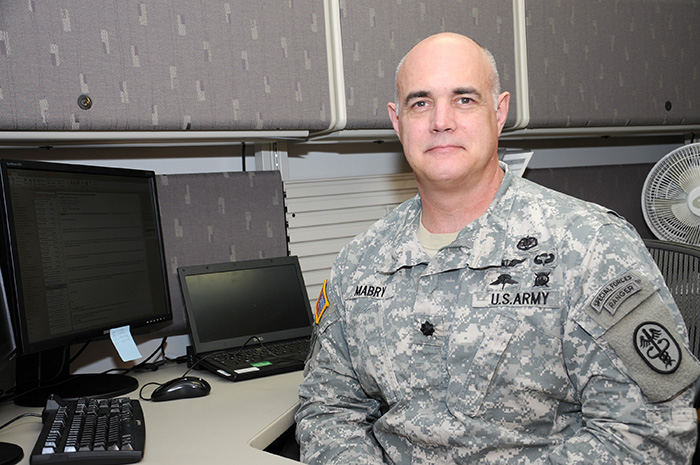ISR Physician Accepted into Prestigious Capitol Hill Fellowship

For the first time since its inception in 1973, an active duty Army Medicine doctor will be a Fellow at the Robert Wood Johnson Foundation Health Policy Fellows program. Lt. Col. (Dr.) Robert L. Mabry, the Joint Trauma System Director for Trauma Care Delivery at the U.S. Army Institute of Surgical Research will begin his year-long fellowship in September as a member of the 2015-2016 RWJF Health Policy Fellows Program.
For more than 40 years the RWJF has worked to improve health and health care. The Foundation strives to build a national culture of health that will enable all to live longer, healthier lives now and for generations to come.
"The reason I wanted to do this was to improve my capacity as an AMEDD leader by seeing first-hand how things work at the political and strategic level, and to see how senior leaders deal with tough challenges," said Mabry.
With an illustrious 31-year Army career thus far, Mabry believes that his experience as an enlisted Soldier and a commissioned officer on the Colonel promotion list gives him a unique perspective on trying to improve combat casualty care.
"I've have served as an Infantryman, a special operator, a combat medic and now as a doctor," he said. "I've taken care of Soldiers under fire on the battlefield, during tactical evacuation on board MEDEVAC, at remote, forward an aid-stations and in the hospital. I think my prior enlisted and special operations combat service gives me a unique insight into casualty care that is rare within the AMEDD."
Through personal experience while treating casualties on the battlefield and through research, Mabry is changing how combat casualties are treated at the point of injury. As a high-speed Special Forces medic, well-trained with the latest tools and techniques available, Mabry served with an elite special operations unit in Mogadishu, Somalia - the operation made famous by the movie Blackhawk Down.
"Back then, we were taught to perform civilian oriented prehospital care under fire on the battlefield. Care that was based on car wrecks and heart attacks," recalled Mabry. "Things like immobilizing someone's spine if they had any injury to above the shoulders, using tourniquets only as a 'last resort' or putting an IV into someone with a simple gunshot wound when the bleeding is under control. Looking back, it did not make much sense, but that's how we were trained."
Based on research that Mabry did while assigned to the ISR during his first tour, the Army spent $70 million to upgrade flight medic training to meet that of civilian critical care flight paramedics. The research compared outcomes of casualties flown by critical care paramedics from the National Guard to those flown by Army flight medics. The data showed a 66 percent reduction in death by National Guard flight medics who were trained critical care flight paramedics.
"One of my most prized possessions is a patch from the Critical Care Flight Paramedic Class 001," Mabry said.
Another accomplishment that Mabry is proud of ' and one that he has been working with for the last four years ' is establishing the current Military Emergency Medical Service and Disaster Medicine Fellowship Program.
"It's the only program in the Department of Defense that trains doctors to understand out-of-hospital care," he said. "The research that we've done here at the ISR shows that prehospital setting is the area where we can make the most significant difference in combat casualty care survival, yet today, I am the only board certified prehospital specialist on active duty in the DoD."
Mabry said that his experience in Somalia planted a seed in him to dedicate his career to improving combat casualty care. It's something that stuck with him when he went from Sgt. 1st Class to 2nd Lt. Mabry to attend medical school at the Uniformed Services University of the Health Sciences shortly after the Mogadishu incident.
"Mogadishu was a big game changer for me," he said. "I have been driven to improve the care of Soldiers on the battlefield since then."
Nowadays his motivation remains the same, except that there's an extra incentive for him. Both of his sons are in the military - one is an Army Ranger and the other is in the Naval Academy with aspirations to become a Navy SEAL or a Marine.
"So I'm personally invested to taking care of Soldiers out in the field," said Mabry.
Mabry believes that the fellowship at RWJF will help him to continue to make a difference in Army Medicine and combat casualty care.
"We are organizationally focused on hospital based care. Once a casualty reaches the hospital, most survive," Mabry said. "But our data shows the vast majority of combat deaths that are potentially salvageable die before reaching the hospital. We need more focus on prehospital care. That's where I believe that I can continue making a difference for our Soldiers."
 An official website of the United States government
An official website of the United States government
 ) or https:// means you've safely connected to the .mil website. Share sensitive information only on official, secure websites.
) or https:// means you've safely connected to the .mil website. Share sensitive information only on official, secure websites.


